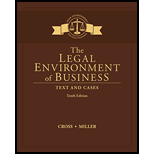
Case summary: The company W employed a woman A for making detailed notes of the discussion for the script writing. During the meetings, three of the scriptwriters made obscene and vulgar jokes and showcased sexual gestures, but W never complained about it. They also conversated about their personal sexual fantasies and experience to further use it in story. Sometime later, A lost her job and filed a lawsuit against the company W alleging that her termination was a result of racial discrimination.
To find: The type of A’s claim of discrimination.
Explanation of Solution
Title VII of Civil Rights Act forbids any kind of discrimination, intentional and unintentional, at the workplace. In a case of intentional discrimination, the person must show a prima facie case of discrimination by the employer to the Court while unintentional discrimination can be inferred from the practices and procedures of the employer.
In the given case as A does not have enough evidence to prove intentional discrimination as she was not discriminated at any stage, she can bring her claim under unintentional discrimination.
Want to see more full solutions like this?
Chapter 21 Solutions
The Legal Environment of Business: Text and Cases (MindTap Course List)
- Beginning inventory was $4,000, purchases totaled $31,000, and sales were $20,000. What is the ending inventory?arrow_forwardGrant Industries had $200,000 in sales on account last year. The beginning accounts receivable balance was $15,000, and the ending accounts receivable balance was $18,000. What is the company's average collection period?arrow_forwardCan you please solve this financial accounting issue?arrow_forward
- 24. General Accounting Problem: The liabilities of Ula Company are $87,060. Also, common stock account is $145,800, dividends are $91,610, revenues are $443,250, and expenses are $316,360. What is the amount of Ula Company's total assets?arrow_forwardWhich financial statement provides an overview of a company’s changes in equity during a specific period?a) Income Statementb) Balance Sheetc) Cash Flow Statementd) Statement of Retainedarrow_forwardFinancial accounting questionarrow_forward
- Can you help me with accounting questionsarrow_forwardPlease give me true answer this financial accounting questionarrow_forwardA company has a total cost of $50.00 per unit at a volume of 100,000 units. The variable cost per unit is $20.00. What would the price be if the company expected a volume of 120,000 units and used a markup of 50%? Helparrow_forward
 Management, Loose-Leaf VersionManagementISBN:9781305969308Author:Richard L. DaftPublisher:South-Western College Pub
Management, Loose-Leaf VersionManagementISBN:9781305969308Author:Richard L. DaftPublisher:South-Western College Pub
